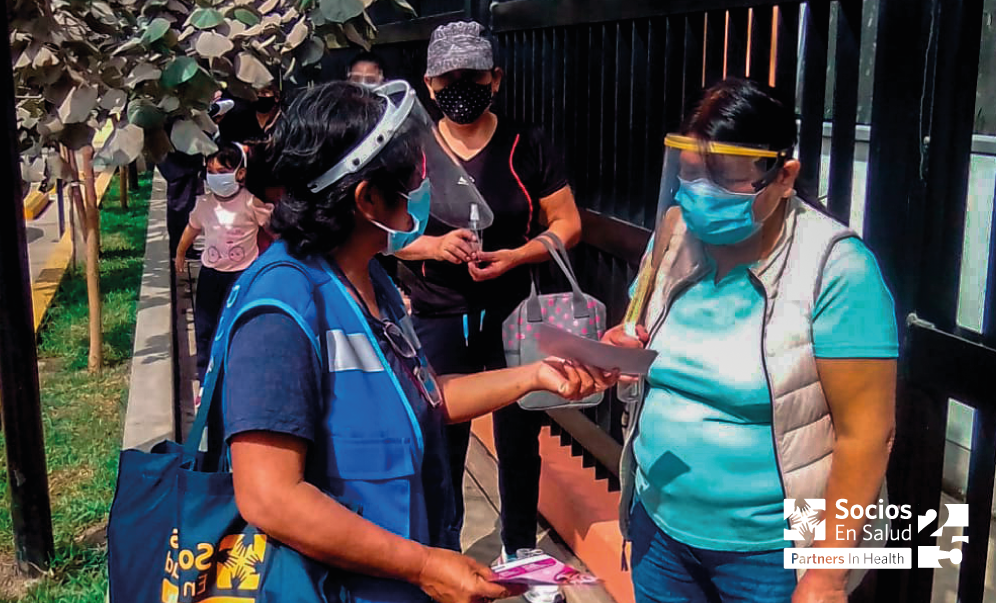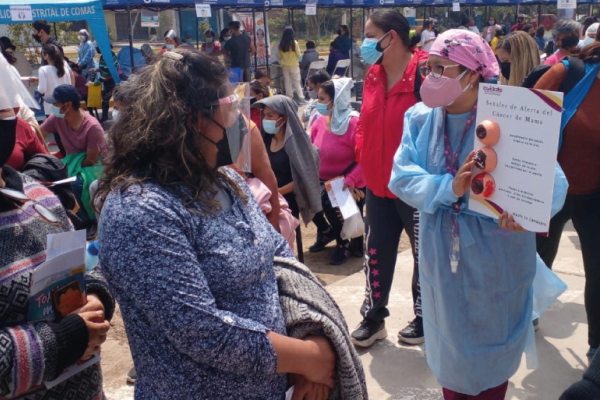About 837 women in North Lima, aged 50 to 69, accessed a clinical breast exam through the ALMA project of the Community Health Program of Socios En Salud.
In 2018, the National Institute of Neoplastic Diseases reported 11865 cancer cases, of which, 1373 corresponded to breast cancer, a statistic that positions this difficult disease as a public health problem.
In Latin America, cancer ranks third among causes of death. In Peru, according to the Directorate of Cancer Prevention and Control of the Ministry of Health, breast cancer is the second most frequent neoplasm, followed by cervical cancer, prostate cancer and lung cancer. Seventy-five percent of cancer cases are diagnosed when the disease is at an advanced stage, a reason that significantly reduces the chances of recovery.
[caption id=”attachment_1621” align=”aligncenter” width=”996”] Dra. Yesenia Juarez, obstetrician at the Santa Luzmila II Maternal and Child Health Center and Vania Vargas, patient of the ALMA project of Socios En Salud.[/caption]
Getting a medical appointment continues to be a health access problem, even more so in this context of pandemic caused by the COVID-19. The factors contributing to this low coverage are: the low availability of equipment at the first level of care, and the lack of human resources for taking and reading the mammogram. Therefore, it is necessary to establish innovative strategies that facilitate women’s access to mammography screening, diagnosis, and timely treatment, which are key to reduce morbidity and mortality from breast cancer.
Under this approach, since August 2020, with the aim of strengthening health systems, Socios En Salud, in alliance with ROCHE PERU, and in coordination with the Cancer Prevention and Control Strategy of the Dirección de Redes Integradas de Salud de Lima Norte, launched the ALMA project, a community intervention to increase the detection of breast lesions at the first level of care.
This intervention aims to contribute to the reduction of the incidence and mortality rate in women aged 50 to 69 years living in the jurisdiction of two Maternal and Child Health Centers (CSMI): El Progreso (Carabayllo) and Santa Luzmila II (Comas). Both health facilities have low mammography coverage, barely reaching 0.3%, due to a lack of technological equipment.

Therefore, it implemented 4 strategies to actively search for women at risk of having breast lesions:
- Chatbot ALMA: virtual platform that allows connecting with women at risk age for breast cancer, to facilitate a preventive and free mammography service. Of the 1,000 women recruited by this means, a screening evaluation was carried out to identify the existence of risk factors that merit clinical attention and 15 of them met the necessary criteria and agreed to a clinical examination.
- Community Health Agents: a human team is responsible for recruiting, educating and accompanying participants throughout the care process. They also visit markets, squares and streets in order to connect the community with health care services. This intervention is carried out under strict biosecurity protocols that avoid the risk of contagion by Covid-19.
- Social networks: necessary to disseminate awareness campaigns and educate women on prevention, diagnosis and timely treatment of breast cancer.
- Health Facilities, in coordination with the Cancer Prevention and Control Strategy of the Directorate of Integrated Health Networks of Northern Lima, actively participate in order to improve breast cancer information systems through virtual awareness campaigns, provide timely care of suspected cases and timely treatment of confirmed cases.
Yesenia Juarez, obstetrician at the Santa Luzmila II Maternal and Child Health Center, recommended practicing breast self-examination once a month, as well as annual mammography screening. These practices will allow early detection of any type of lesion.
“In addition to the treatment and care of the project, ALMA seeks to educate the community and combat the stigma of misinformation surrounding breast cancer. The testimony of women, such as Ms. Vania, who received care and developed a treatment plan, is key to engaging patients, families and communities in difficult but important conversations about breast health. There is a lot of misinformation regarding the different tests used to detect breast cancer. This is a collaborative effort alongside doctors, administrative staff and patients,” shared Giuliana Hernandez, obstetrician and ALMA project coordinator for Socios En Salud’s Community Health Program.
As well as Vania, 837 women had a mammogram, 885 accessed clinical exams and were sensitized and educated on breast cancer prevention, and 9 were referred to a health facility of greater complexity for complementary exams.
“Women, do not wait to go to health facilities, only when you feel pain or discomfort. It is in our hands to detect breast cancer early,” added Hernandez.
From Partners In Health we will continue working to integrate systems from the community level, followed by the primary care level and culminating with the hospital level. We will do everything we can to make our patients’ right a reality.
If you are between the ages of 50 and 69 log on to: https://casi.sociosensalud.org.pe/Evaluaciones/ALMA/ and rule out possible breast lesions through a free mammogram.
.
